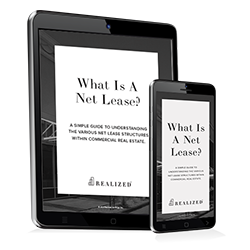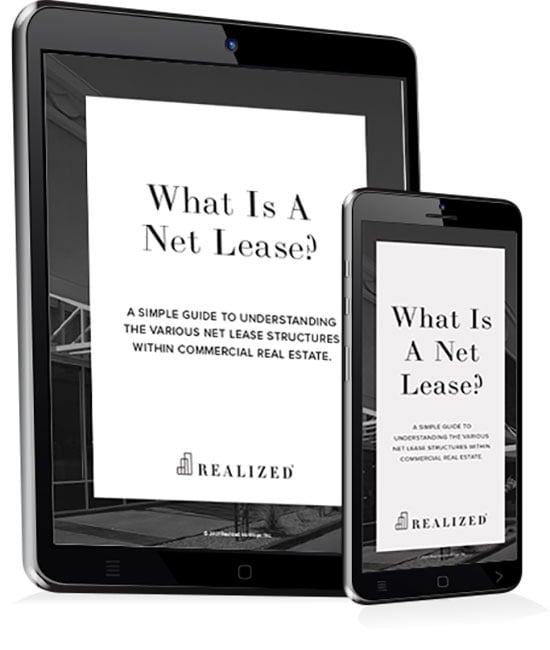
Triple net leases, otherwise called NNN leases, have been gaining popularity over the past few years due to the benefits these structures offer, especially for commercial property investments.
As an investor, however, if you’re considering putting your capital in an NNN property, it’s important to understand not just the pros but the NNN disadvantages as well. Having a good grasp of these considerations helps you set expectations and find the balance between risk and reward.
Below, Realized 1031 shares triple net lease pros and cons to help you assess this financial structure and determine if including one in your portfolio is the ideal move.
Defining NNN Leases
NNN leases are lease arrangements where the tenant, aside from paying rent, handles all three net operating expenses: property taxes, insurance premiums, and maintenance costs. In a gross lease, the tenant only pays for the rent. However, an NNN lease shifts additional financial responsibility to the tenant. Other arrangements, like N leases and NN leases, also exist. However, these do not provide the same level of hands-off management that NNN leases offer.
The most common applications of NNN leases are commercial properties, particularly ones that are used by tenants in industries like retail, healthcare, and hospitality. These tenants often prefer the complete control of net operating expenses for branding purposes, industry standards compliance, and consistency across their various locations.
Triple Net Lease Advantages
Thanks to the structure of triple net leases, investors or landlords can expect the following NNN pros.
Stable and Predictable Income
One of the main pulls triple net leases have is the high chance for steady and predictable income. The net operating expenses of a rental property can be highly variable, especially with inflation causing maintenance costs and insurance premiums to rise or fall depending on the time period. When you let the tenant handle these less predictable expenses, you can expect less volatility in your cash flow and steady income.
Hands-off Involvement
In a traditional gross lease, you’re still responsible for the operating expenses of the property. You’ll need to handle tenant complaints, too, and provide the necessary solutions to these issues. However, NNN leases allow tenants to be responsible for the property. They handle maintenance, insurance needs, and unexpected expenses brought about by normal operations. This arrangement frees you from hands-on responsibilities, enabling truly passive income.
Hedge Against Inflation
Real estate, by nature, can serve as a hedge against inflation. This benefit stems from the rent escalation that happens when inflation rates rise, especially when such a clause is included in the lease terms. With this possibility, investors can maintain a steady income that provides an additional cushion when other assets are underperforming.
Tenants With Strong Credit and Reliability
NNN lease structures typically attract high-quality tenants. These are companies that have high credit ratings and robust business models, such as fast-food chains, pharmacies, and retail banks. These established tenants help investors reduce the chances of defaults or vacancies, increasing the chances of steady, long-term income.
Potential for Portfolio Diversification
NNN properties provide access to a range of industries, which is one of the valuable triple net lease benefits for those who are looking to spread risk. From healthcare facilities and quick-service restaurants to convenience stores and auto shops, these assets allow diversification beyond traditional residential or office real estate.
Triple Net Lease Disadvantages
While NNN benefits are attractive, there are triple net lease risks that you need to be aware of and plan for. Here are some of the most prominent challenges and pitfalls you may encounter.
High Upfront Investment
Properties that attract national brands or franchises are usually large structures in high-demand locations. This reality makes NNN properties hard to get into, requiring considerable amounts of capital. If you’re a small-time investor looking to diversify, NNN assets will be hard to acquire and prevent you from further portfolio diversification.
Limited Flexibility
NNN leases often last 10 to 25 years, which provides the stable cash flow benefit. However, this arrangement also locks in investors for decades. So many things can happen within these years, such as market downturns or lower demand for the tenant’s industry, which could result in the property’s underperformance. Since your capital is locked up, you may find it harder to reposition yourself to take advantage of new opportunities.
Risks of Vacancy and Tenant Default
No business is completely immune to failure. Even tenants that have high creditworthiness can fall prey to bad business practices or lower demand, resulting in tenant default and vacancies in the NNN property. Finding another tenant can be costly and difficult.
Lower Potential for Value-adding Strategies
Given the shift of control to the tenant, investors can do little to boost the net operating income of an NNN property. The tenant takes over maintenance and improvements, limiting what you can do to redevelop the property and create additional value.
Balancing NNN Advantages and Disadvantages as an Investor
NNN properties carry both opportunities and risks that you must assess carefully. The benefits include predictable income, reduced landlord responsibilities, and exposure to strong tenants. However, there are also triple net lease cons, such as high upfront costs, lack of flexibility, and the possibility of tenant default.
Given these possibilities, NNN leases are generally better for investors who want long-term passive income. The nature of this agreement makes it function like a bond, where you receive valuable returns over time with relatively low volatility. Looking at NNN leases through this lens helps you determine if such an arrangement is ideal for your current investment goals. If you’re someone who still wants to remain in control, then the NNN cons may make this strategy unfit for your current needs.
Wrapping Up: Understanding NNN Risks and Benefits
Understanding the advantages and disadvantages of NNN leases serves as a crucial practice for investors. Wherever your priorities lie, the knowledge can help you determine if such an investment fits your risk profile, diversification strategy, and overall investment goals.
Sources:
https://www.investopedia.com/terms/t/triple-net-lease-nnn.asp
https://www.baymgmtgroup.com/blog/inflation-impact-real-estate/



